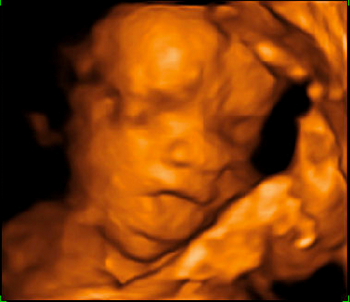This leaflet is to help you understand what Macroglossia is, what tests you need, and the implication of being diagnosed for you and your baby.
What is Macroglossia?
Macroglossia is an abnormal enlargement of the tongue. Macroglossia can be either true or relative. True macroglossia is due to changes in the structure of the tongue causing enlargement, whereas relative macroglossia is when the tongue appears large due to changes in surrounding structures such as the jaw or decreased tone in the muscles of the mouth.

What causes Macroglossia?
Macroglossia can be the only ultrasound finding (isolated) or can be associated with one of several conditions. Isolated macroglossia is commonly caused by the enlargement of the muscle of the tongue. Macroglossia can be caused by a condition called Beckwith-Wiedemann Syndrome (BWS). BWS is an abnormality of genes that control fetal growth, this results in overgrowth of multiple structures including the tongue. Trisomy 21 or Down Syndrome can also cause macroglossia. In Down Syndrome, there is a normal-sized tongue, but it appears enlarged due to decreased muscle tone and small bones of the face.
How are chromosomes relevant to Macroglossia?
Babies with macroglossia can have trisomy 21 or Down Syndrome, which is an extra chromosome in the 21st pair. This condition can also be associated to other genetic syndromes that are caused by a more complex genetic variation. These disorders, such as BWS, are not detected by routine chromosome analysis.
Should I have more tests done?
Pregnant individuals may have more tests done to know more about the condition of the baby. The tests available depend on your gestational age. Tests to ask about include:
• Detailed ultrasound examination: To look at your baby for any other anomalies. Ultrasound can identify many but not all abnormalities.
• Fetal echocardiogram: This is an ultrasound that focuses on the baby’s heart. Heart anomalies can be seen in several conditions that also cause macroglossia. Knowing if there is a heart defect present can help guide the care during pregnancy and once the baby is born.
• Amniocentesis: This test removes a small amount of fluid from around the baby with a thin needle. The fluid is tested to diagnose genetic conditions such as Down Syndrome by a test called Karyotype, and it can also detect BWS, utilising tests like a microarray or methylation study.
• Cell-free fetal DNA: This is a maternal blood test that tests your baby’s DNA. It is a very good screening test for certain conditions but does not yield as much genetic information as an amniocentesis. When an amniocentesis is not performed this blood investigation could test for some genetic conditions and the sex of the baby.
When macroglossia is identified or suspected on ultrasound, talking to a genetic counsellor is recommended, because even in the absence of other birth defects, macroglossia can be associated with genetic disorders. Having this conversation can assist parents to decide on the different testing options available before and after birth.
What does it mean for my baby after it is born?
The long-term outcomes and complications of macroglossia depend on the cause. Some babies with this condition have no issues and have a normal life. In other cases, some babies may have complications that range from difficulty breathing to feeding problems, and difficulties sleeping, speaking, and appearance.
Will this happen again?
The risk of having a second child affected with macroglossia depends on the cause. If the macroglossia is isolated, the risk of another child being affected can be up to 50% in a future pregnancy. If the baby affected has Down syndrome, then the risk of this happening again in a future pregnancy is much lower (1-1.5%) however, the risk can be higher if Down syndrome is caused by certain genetic make-up of the parents. For BWS, this chance is more variable and can range from <1% to 50% depending on the genetic variations of the parents.
What other questions should I ask?
- Are there any other abnormalities on the ultrasound?
- What kind of genetic testing will I need to have?
- How often will I have ultrasound examinations done?
- Will my baby need surgery after delivery?
- Where should I deliver?
- Can I meet the team of doctors that will be assisting my baby when it is born?
Last updated September 2022
